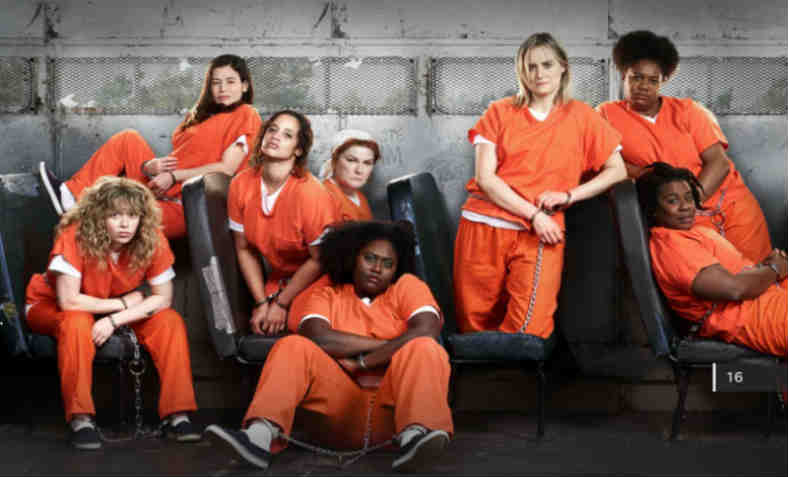 Orange Is the New Black poster. Photo: Netflix
Orange Is the New Black poster. Photo: Netflix
Beyond the sly humour and emotive character interactions lies a story of deep institutional repression and desire for radical new approaches to justice, argues Jago Corry
Orange is the New Black is one of the most prominent series on the streaming service Netflix. Infamous for its sly humour and brilliantly emotive character interactions and developments, the latest series (2018) delves deep into the prison crisis occurring in contemporary America, ultimately it achieves in telling a story of repressed black women desperate for justice. Much of its viewers will for the first time get a glimpse to the lives of prisoners and start to understand the emotive, social and economic forces that result in a person becoming trapped within the prison system.
The first scenes of the series open with the character Suzanne Warren, who has numerous mental health issues and is nicknamed “crazy eyes”. She is among numerous other prisoners, responsible for the previous seasons’ instability and riot which resulted in the death of a prison guard, they are thus sent to max (max security prison) where prisoners are put into long distances of solitary confinement.
Viewers are also introduced to the game ‘fantasy football league’ where the prison guards play for money on possible scenarios; killings, stabbings, sexual encounters and ‘gang wars’ are all on the table revealing that prison guards could win the jackpot by betting money on the life of a human being. With the producers creating these scenarios within the dark, humorous tradition of the series, it writes a story more and more explicit in its depictions of prison horror. One crucial element to this story is its exposure to the issue that is at the heart of current political discourse within America’s emerging left, black rights.
The central plot after season four is the ‘killing’ of black inmate ‘Poussey Washington’ which based the entire motive for the inmates rioting. The central character in this struggle ‘Tasha “Taystee” Jefferson’ who is written and played as an articulate, empathetic, charming character who is revealed throughout the series to have a struggled past of foster caring, poverty and a lack of direction within one of America’s deeply repressed black communities.
The series tells the story of an angry, incarcerated and increasingly revolutionary woman that demands the basic right of a free trial for the death of her friend Poussey. Taystee argues that because her closest friend was an imprisoned black woman, the societal and institutional desire for a trial and fair acknowledgement of the life of Poussey was devoid compared to both the life of the white, male dead prison guard and the white middle class jury of her own murder trial. It is explicitly framed to show that both her and Poussey are fundamentally less valued within the racist, patriarchal American system.
Series six ends with Taystee being charged of murdering the dead prison guard of which she rightfully pleads innocent however does put her at risk of a death sentence. She does this to stand up against the powerful prison and judicial system that had robbed years of freedom from her and resulted in the death of her closest friend. In her pursuit for justice, she becomes a voice for the political group Black Lives Matter. This plays out as a powerful, emotive story while bit by bit displays the decaying possibility of any form of justice for Poussey and herself.
‘Prison Break’ is also another prominent prison themed television series where its creators choose to frame the inmates as violent, cruel and cold figures who deserve the suffering they get in and out of prison. Orange Is The New Black creates an incarcerated world full of deeply relatable figures who collectively, have experienced every form of repression and inequality within contemporary America.
So far, this series has achieved something very important; To express the true human cost of America’s prison complex while, for its more middle-class white viewers, giving an emotive, intensely personal depiction on what it’s like to take on the most racist, inhumane institution of capitalism.
August 21st of this year represented fourty-seven years after the assassination of the Marxist theoretician George L. Jackson, yet again this historic mark sparked numerous sit ins, hunger strikes and riots across the summer in the ongoing, desperate struggle to give very basic human rights to 2.2 million imprisoned people living in the richest country in existence. The riot scenes in Orange Is The New Black where every inmate from all ethnic minorities and ‘gangs’ group together to combat the institution that killed their friend Poussey could be described in Jackson’s own words
‘Settle your quarrels, come together, understand the reality of our situation, understand that fascism is already here, that people are already dying who could be saved, that generations more will live poor butchered half-lives if you fail to act. Do what must be done, discover your humanity and your love in revolution.’
Orange Is The New Black represents a growing trend of political engagement within the enormous expansion of Netflix media. The creators are of course not directly calling for any form of revolutionary political movement however, they’re clearly attempting to fundamentally question how and why America incarcerates people.

